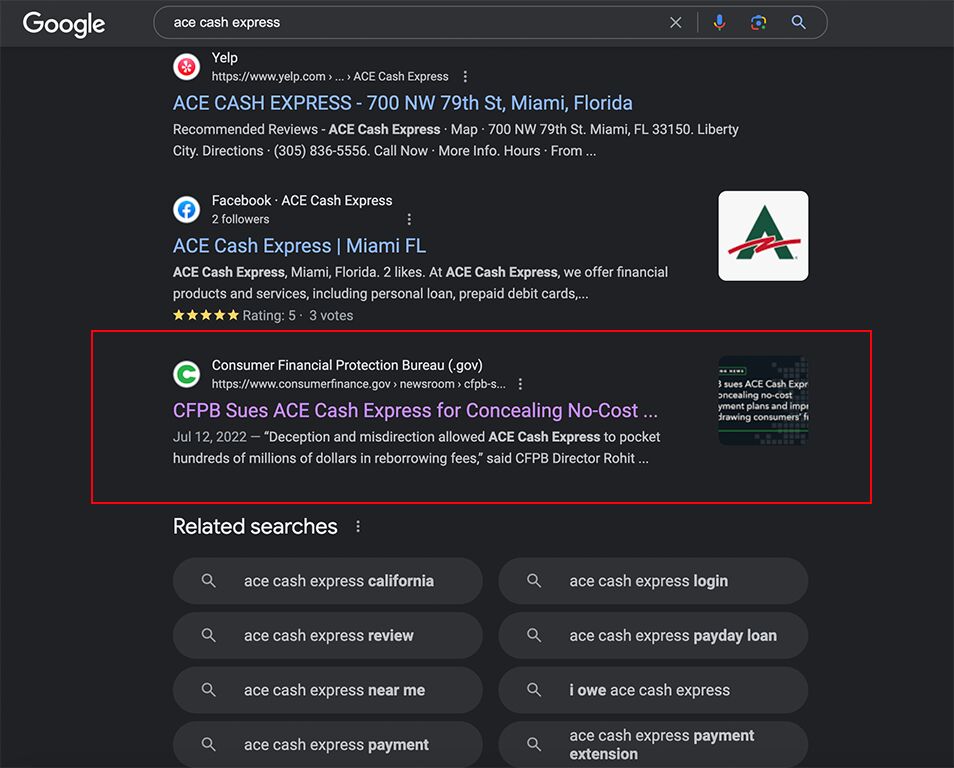What is Search Engine Reputation Management?

Online reputation management refers to overseeing and influencing a brand’s reputation. With the rise of the internet and social media channels, we’re now in a digital-first world where we increasingly live out our lives online. This has made search engine results an essential part of any business’s online reputation, regardless of industry.
According to The World Economic Forum, around 25% of a company’s market value is directly related to its online reputation. That’s why maintaining a good online reputation is crucial for brands with an online presence and search engine reputation management (SERM) is a major part of that.
What is Online Reputation Management?
Online reputation management (ORM) helps to build and/or improve your identity on the web. The process involves generating positive content and maximizing it across all areas of the internet while minimizing negative content.
Online reputation management is what your customers see when they type your company’s name into Google. What are they likely to find? What are their impressions of those findings? Are they more or less willing to work with you after that?
Social media profiles, review platforms, and online forums all play significant roles across search engine result pages. These are customer resources that will heavily influence your online reputation – making it important to monitor them at all times.
What is Search Engine Reputation Management?
Search engine reputation management (SERM) involves monitoring, tracking, and influencing what shows up about you or your company on search engines, such as Bing and Google.
SERM includes search engine optimization (SEO), paid search advertising, press releases, and positive social media coverage. The main goal is to address and improve negative search results by either removing or suppressing negative content.
Negative content, reviews, or bad publicity about your company or personal brands can be extremely harmful to your business and overall revenue.

Being involved in a lawsuit can really hurt how customers perceive you and interact with your brand.
Even if you win the lawsuit, this could cause thousands or even millions in damages and brand sentiment.
Looking to fix your search engine reputation? Schedule a free call with Jon Torres here.
How Does SERM Work?
Search engine reputation management (SERM) gives businesses the opportunity to manage and elevate information the public sees in search results about their brand.
You have to find opportunities to improve rankings with positive content and drown out negative search results. This is done in a number of different ways, which we will discuss in detail throughout the article.
In short, search engine reputation management is about presenting the brand in the best way possible so it can gain passive brand equity. Building brand equity is all about the business-to-customer relationship and the factors that influence visibility and loyalty.
Brand value, on the other hand, refers to the monetary value of the business.
With SERM, your main concern is brand equity. Any loss of brand reputation or equity can lead consumers toward competitor online businesses instead of yours.
If you want to know how your Search Engine Reputation looks? schedule a call with Jon Torres.
Why Does Reputation Management Matter?
There is no such thing as a passive audience anymore. Your customers can express their voices and communicate their message – positive or negative – in an extremely powerful way. This means your site should not be a static hub for information. Interaction on social media and review sites is essential for any business to succeed in today’s day and age.
No matter the size or scope of your business, we can guarantee that people online are talking about it. This includes prospects, existing customers, clients, friends, and many more. They could make an Instagram post about your product, post an update about the customer experience on their Facebook page, comment on your blog, and the list goes on.
Reputation management helps you monitor the conversation and influence the narrative when needed. You need to digest customer feedback and face it promptly. This will improve the way you are seen online.
Search Engine Reputation Management Strategies
Search engine reputation management is achieved through various strategies.
1. Constant Monitoring
To optimize your search engine reputation, you must first monitor it. Sort through search engines, review sites, and other online resources that potential customers are looking for.
The core objective is to have a presence on the platforms new and existing customers are interacting with. That way, you can answer their questions, address their concerns, and directly respond to any negative feedback regarding your company.
2. Search Engine Results Pages (SERP) Cleansing
A search engine results page, or SERP, is the first page users see after entering a query into Google, Yahoo, or any other site. SERP cleansing involves cleaning the first pages of search results from any negative reviews or information about your company.
The most effective way to do this is by continuously publishing and optimizing positive mentions related to your company. This includes reviews, guest posts, press releases, and more.
3. Improve SEO Rankings
Search engine optimization (SEO) refers to the process of optimizing site content for search engine algorithms and getting it to rank higher in the search results. When your company improves its ranking, it means more qualified traffic, higher conversion rates, and greater profits.
While there are hundreds of scoring factors to consider, search engines prioritize relevant and valuable content on a website or web page. In simpler terms, you influence the ranking of positive information on your company or mitigate the impact of negative information.
Here are some of the most important SEO strategies:
- Fulfill search queries by developing and optimizing content to meet audience needs.
- Improve site performance and accessibility.
- Build site engagement with a responsive web design, including visuals, navigation, and branding.
- Include social media sharing buttons to enable visitors to save and share content.
- Use keywords in the H1 tag, subheading, and first paragraph of your webpage.
- Build SEO-friendly URLs and use internal links that allow users to easily navigate your website.
- Pay attention to the title, meta description, publication date, and domain name.
- Only publish high-quality, valuable content that will engage your audience.
Looking to fix your search engine reputation? Schedule a free call with Jon Torres here.

Social Media Content
Social media is an increasingly powerful tool to create and build an organic audience. It provides an outlet to connect directly with your customers and establish trust within that community. Social media also offers an opportunity to improve SERP positions.
The more engaged you are with your audience on social media, the more trustworthy your company appears to search engines. For example, positive reviews and brand mentions will help your ranking with search results and overall online presence.
Create official accounts for your company on the social media platforms most relevant to your niche. You can start with Facebook, Instagram, Twitter, LinkedIn, YouTube, and other major networks.
Be active and engage with your audience. This might include reacting to comments, responding to online reviews, announcing company updates, and answering every customer who reaches out.
You can also introduce certain hashtags unique to your brand and/or niche. That way, customers can use the hashtag for their own content and create user-generated content (UGC) for your company. This will influence SEO rankings and SERM results.
Reply to Negative Content
Most review sites allow companies to respond to negative reviews. This provides the perfect opportunity to directly address an unsatisfied customer who had a negative experience with your company.
If you can solve the issue, the customer may be inclined to remove or adjust their negative review. That’s why it’s important to proactively monitor all consumer forums and review sites talking about your brand.
Promote Positive Content
Create and promote positive content surrounding your brand. When search engines associate your business and its product/service with relevancy and positivity, your web pages will rank high. This will build your reputation and increase brand visibility.
Just one negative article on the first page of Google results can influence the purchase decision of a customer and impact your business. Pushing positive content can minimize that negative exposure.
You can ask satisfied customers to share their experiences on social media and review platforms. This builds authority in the marketplace and improves your brand reputation.
Looking to fix your search engine reputation? Schedule a free call with Jon Torres here.
Conclusion
Online reputation management and search engine reputation management starts and ends with your audience. Listen to what your customers have to say and find ways to connect with them. This will help to build a community of loyal customers, which contributes to increased brand awareness, high-intent traffic, and ultimately revenue.
While replying to criticism online and building a SERM strategy is critical, it’s not always enough to protect your business from negativity. Consider getting professional help to monitor and optimize your online reputation.



